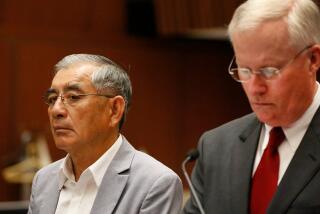FPPC Names Sen. Doolittle in Complaint Over Mailer
- Share via
SACRAMENTO — State Sen. John Doolittle was accused Thursday by the California Fair Political Practices Commission of violating campaign contribution disclosure laws in the preparation of an 11th-hour pre-election mailer that the agency said may have helped defeat independent Sen. Ray E. Johnson in a bitterly fought race last year.
Named in the complaint with the Republican lawmaker from Sacramento County were John Feliz, a Doolittle campaign strategist, and Jack Hornsby, a virtually unknown and underfinanced Democratic nominee in the race.
Doolittle, Johnson and Hornsby competed in Northern California’s sprawling 1st Senate District, which stretches from Sacramento to the Oregon border.
The FPPC said the Republican candidate plotted behind the scenes to help his underdog Democratic opponent, in hopes of taking support away from the well-known incumbent independent, and then did not report it.
A spokeswoman for the commission, which is responsible for enforcing campaign contribution disclosure laws, said Doolittle and Hornsby and their campaign committees, if they are found guilty, each face a maximum fine of $8,000. Feliz could receive a maximum fine of $4,000. The commission set no date for a public hearing on the issue.
Doolittle and Feliz, through spokesmen, denied any wrongdoing. Hornsby, a retired El Dorado County aerospace engineer, was unavailable for comment.
The commission charged that Doolittle, Feliz and Hornsby failed to report as a non-monetary contribution Feliz’s help in preparing a mailer for Hornsby that was sent to Democratic households in the waning days of the 1984 campaign.
The commission said that after the election, Feliz directed Doolittle’s political financier to round up money to pay for Hornsby’s mailer. Hornsby received $7,300 from Feliz and Doolittle’s chief money raiser, Jim Grubbs, the commission reported.
Shortly after the election, Johnson complained that the mailer, sent to targeted labor union households, constituted a “dirty trick.”
Senate Democrats had poured at least $85,000 into Johnson’s campaign in the final days of the race in a desperate effort to defeat Doolittle, who they regarded as a reactionary conservative.
Quit Republican Party
Johnson, first elected to the Legislature in 1964, quit the Republican party in 1983 in a falling out with the GOP over reapportionment of his district.
The commission charged that Doolittle and Feliz decided about two weeks before the election that Feliz “should help Jack Hornsby generate publicity to attract votes which might otherwise go to Ray Johnson. . . . Feliz contacted Hornsby and offered to set up a committee for Hornsby and coordinate the committee’s sending of a mailer. Hornsby agreed to Feliz’s offer.”
Doolittle won with 121,353 votes, followed by Johnson at 112,226 and Hornsby at 35,978.
The commission charged that at least $1,000 in professional services from the Doolittle campaign to the Hornsby campaign should have been reported as non-monetary contributions and should have been disclosed by both operations.
Ted Blanchard, a spokesman for Doolittle, said: “Any conversations that Feliz had with Hornsby are volunteer personal services under the (1974 Political Reform) Act. The code section says contributions do not include volunteer personal services.”
He said Doolittle “had nothing to do with conversations between Hornsby and Feliz. He knew nothing about it.”
More to Read
Sign up for Essential California
The most important California stories and recommendations in your inbox every morning.
You may occasionally receive promotional content from the Los Angeles Times.













